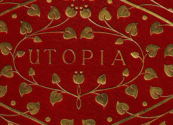Discussion Questions on Voltaire, Adorno and Horkheimer
by Kate Eickmeyer
1. Candide’s famous source of salvation is “to work without theorizing,” and our heroes ultimately find refuge in relatively physical forms of labor: farming, cooking, embroidery, and carpentry. But what if one’s work, like ours, is theorizing? Voltaire, after all, is a writer and not a farmer. It seems to me that the real salvation Candide offers us isn’t just labor, but the redemptive powers of art and humor; the book itself delivers us from the despair of unnarrated suffering. Why doesn’t Voltaire allow the characters that same salvation through art or humor? And why does he turn to the solution of work so abruptly, without anticipating this idea anywhere earlier in the text?
2. “Not only is domination paid for with the estrangement of human beings from the dominated objects, but the relationships of human beings, including the relationship of individuals to themselves, have themselves been bewitched by the objectification of mind. Individuals shrink to the nodal points of conventional reactions and the modes of operation objectively expected of them.” (Adorno and Horkheimer 21)
In the context of World War II, the human tendency to be bewitched by the objectification of mind amounts to a willingness to blindly follow tyrants and be complicit in violence, horror and genocide. We can probably take it for granted that maintaining a just, peaceful society requires the political participation of an awake and educated population. But, on the other hand, maybe consumer culture, and the somatic, objectifying effects of radio, television, video games, and other forms of relatively passive entertainment actually promote peace; if we accept Voltaire’s view that a lot of people are savage, brutal hypocrites who will torture, murder and rape for fun, isn’t it better that many of our species are parked in front of the television instead of out wreaking havoc? Does the bread-and-circuses argument that entertainment (or soma, or materialism, or religion) lulls the people into accepting oppressive conditions hold up in the context of Candide, or can we argue that a lot of people would only use a keener awareness of their own subjectivities to inflict horrors on one another, instead of engaging in more thoughtful political engagement?
3. “The principle of immanence, the explanation of every event as repetition, which enlightenment upholds against mythical imagination, is that of myth itself. The arid wisdom which acknowledges nothing new under the sun, because all the pieces in the meaningless game have been played out, all the great thoughts have been thought, all possible discoveries can be construed in advance, and human beings are defined by self-preservation through adaptation—this barren wisdom merely reproduces the fantastic doctrine it rejects: the sanction of fate which, through retribution, incessantly reinstates what always was. Whatever might be different is made the same. That is the verdict which critically sets the boundaries to experience.” (Adorno and Horkheimer 8)
Is Candide an enlightenment or a counter-enlightenment text? Humor is generally the product of identifying the connections and sameness among phenomena, and Voltaire does this with great aplomb. The repetition of events in the book, the anticipation of one form of corruption and horror after the next, and the nearly universal failure of human nature is in itself a kind of fatalism with the flavor that there is nothing new under the sun. Is humor an enlightenment concept? Does Voltaire, so critical of the enlightenment’s hypocrisy, participate in its “principle of immanence?” Does he allow his characters subjectivity and uniqueness?
4. Eldorado seems to be the first true utopia we’ve seen, and Candide and Cacambo’s decision to leave is Voltaire’s statement that a real paradise might be possible, but if we found it, we’d be stupid enough to leave it. Yet the description of Eldorado is primarily visual and Voltaire offers us little in terms of its mechanics. Should we consider Eldorado as a device more than an actual utopia? What do we make of the (whimsical) red sheep? Are there other elements of Eldorado worth exploring in the context of our conversation about utopias?
5. Does one have to labor and produce in order to cultivate one’s garden, or does playing a thousand hours of Mario Kart or looking at pictures of breaded cats also count as cultivating one’s garden? Our culture continues to subscribe to Enlightenment ideas about work and leisure, success and failure, and those who have grown up entrenched in middle class mentalities about this find it very difficult to reorient. But does the CEO who earns $15 million a year actually contribute more to society than the $8 an hour barista? Does our fetishization of status and material culture simply give us something to do and a garden to cultivate? If labor is salvation to keep us clear of “boredom, vice and poverty,” can leisure perform the same service without the need for achievement?
6. How is it that so many grown adults are still walking around saying Panglossian things like “everything happens for a reason” and “you can do anything if you believe in yourself?” Is this the product of magical thinking, enlightenment thinking, cognitive failure, compartmentalization, or something else? Does it even matter that there are a lot of Panglosses walking around, since its better to be surrounded by Panglosses than murderers?


